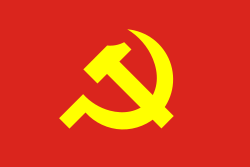6th National Congress of the Communist Party of Vietnam

The flag of the Communist Party of Vietnam
|
|
| Date | 15–18 December 1986 (4 days) |
|---|---|
| Location | Ba Đình Hall |
| Participants | 1,129 delegates (which includes the members of the 5th Central Committee) |
| Outcome | The election of the 6th Central Committee |
The 6th National Congress of the Communist Party of Vietnam (Vietnamese: Đại hội Đảng Cộng sản Việt Nam VI) (CPV) was held in Ba Đình Hall, Hanoi, between 15 and 18 December 1986. 1,129 delegates represented the party's estimated 1,900,000 members. The congress occurs once every five years. Preparations for the 6th National Congress began with 8th plenum of the 5th Central Committee and ended with the 10th plenum, which lasted 19 days. After the 10th plenum, local and provincial party organizations began electing delegates to the congress as well as updating party documents.
The congress is noteworthy because of the introduction of economic reforms, labelled Đổi Mới (Renovation), and the election of a new party leadership. The sitting General Secretary, Trường Chinh was not reelected, and Nguyễn Văn Linh took his place. The 6th Politburo, 6th Secretariat and the Control Commission were elected. The Advisory Council to the Central Committee was established, and contained high-ranking officials who had retired at the 6th National Congress. The 6th National Congress emphasized the need to strengthen the socialist mode of production.
The 8th plenum of the 5th Central Committee (10–17 June 1985)—and its antecedents the 6th (3–10 July 1984) and the 7th (11–17 December 1984) plenums—instructed the party to direct a performance review of its organization, personnel and efficiency.Lê Đức Thọ, head of the Central Organizing Commission, said the party had become "a cumbersome and ponderous mechanism, only marginally efficient, marked by ill-defined responsibilities and poorly divided functions." He further stated that confusion within the party over operational responsibilities between the central party leadership, mass organizations and the state, and between higher and lower party echelons had developed into a serious problem, and that a cynical collective mindset within the party had taken hold and manifested itself through corruption, inflexibility and dishonesty.
...
Wikipedia
